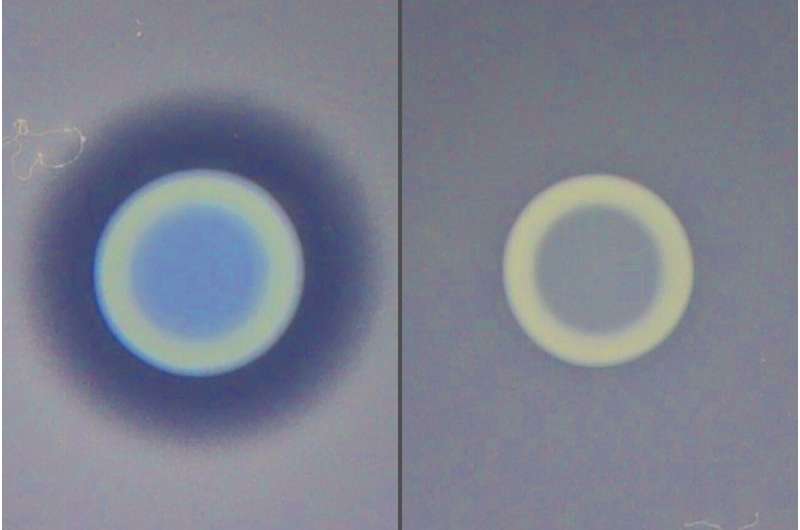This article has been reviewed according to Science X's editorial process and policies. Editors have highlighted the following attributes while ensuring the content's credibility:
fact-checked
peer-reviewed publication
trusted source
proofread
Newly discovered antimicrobial could prevent or treat cholera

More than a million people each year die from infections by pathogens that are resistant to antimicrobials, and the problem is growing. Meanwhile, the discovery of new antimicrobials that can help stem the tide has not kept pace.
Researchers at The University of Texas at Austin see promise in a class of natural antimicrobials called microcins, which are produced by bacteria in the gut and help them compete with rival bacteria. In a pair of recent papers, the researchers identify the first known microcin that targets the strains of bacteria that cause cholera and describe a method for finding microcins in bacterial genomes with the help of artificial intelligence.
"Imagine one day eating yogurt containing probiotic strains of bacteria that produce microcins to prevent or treat cholera, pathogenic E. coli, inflammatory bowel disease or colon cancer," said Bryan Davies, professor of molecular biosciences and a senior author on both papers. "The idea is to put in healthy bacteria that would then be able to continually make microcins in the gut to fight off the pathogen of interest."
The cholera research, published in Cell Host & Microbe, was led by Sun-Young Kim, a Ph.D. candidate at UT.
Cholera, the deadly diarrheal disease caused by Vibrio cholerae bacteria, causes severe dehydration and can kill in just a few hours. According to the World Health Organization, each year cholera is responsible for 21,000 to 143,000 deaths worldwide. Another type of gut bacteria is thought to trigger flare-ups of inflammatory bowel disease. And still another type of gut bacteria is associated with the progression of colon cancer. Each is a potential target for microcins.
Microcins are highly selective, meaning they usually target specific bacteria, unlike traditional antibiotics that broadly kill desirable and undesirable bacteria alike. This means they could potentially remove unwanted bacteria without disturbing the delicate balance of the human gut microbiome crucial to overall health. And because their mechanism of action is different from that of traditional antibiotics, they can still be effective against pathogens that have developed antibiotic resistance.
It's hard to locate microcins in a bacteria's genome because their genetic sequences are very short and diverse. So instead, the team began searching V. cholerae genomes for a larger protein called PCAT, which is associated with microcins and helps export them out of the bacteria that produces them so they can reach other bacteria. It's like when you use a landmark in your neighborhood to help friends find your house ("I'm two doors down from the fire station").
The researchers found about two dozen candidate microcins, all from nonpathogenic strains of V. cholerae. They showed that one of these microcins, dubbed MvcC, kills pathogenic V. cholerae strains. In other words, it's a natural weapon that one bacterial strain uses to outcompete its close cousins.
"You have bacteria in your gut right now making microcins," Davies said. "They're a natural part of how your bacterial communities organize and compete."
So how do V. cholerae strains that produce microcins not poison themselves?
The researchers discovered that the strains of V. cholerae that produce microcins also produce a kind of antidote, called an immunity protease. They demonstrated that—in mice whose guts were infected with pathogenic and nonpathogenic strains of V. cholerae—the bacteria that expressed microcins outcompeted the strains that did not.
The researchers plan to continue the cholera work in three ways:
- Mutating their anti-Vibrio microcin MvcC to be more lethal to V. cholerae and better able to resist degradation in the human body.
- Developing combinations of different anti-Vibrio microcins to prevent the development of antimicrobial resistance.
- Finding which microcin-producing bacterial strains are best at producing and delivering microcins to pathogens in the gut.
In a related paper that will be published soon in a peer-reviewed journal and is available as a preprint, the researchers describe a new AI-based approach to finding more candidate microcins. The approach uses protein LLMs—biological analogs to the generative AI large language models behind chatbots such as ChatGPT—to find sequences that are similar to known microcins. This is one of several AI-based approaches the team is experimenting with that they hope will lead to more microcin discoveries.
"Microcin biology is very unique and extremely understudied," said Claus Wilke, a UT professor of integrative biology and statistics and data sciences, and a co-author on the forthcoming paper. "And so, it's a good field to be in, where there's still a lot to be done and to be discovered."
More information: Sun-Young Kim et al, Antibacterial action, proteolytic immunity, and in vivo activity of a Vibrio cholerae microcin, Cell Host & Microbe (2024). DOI: 10.1016/j.chom.2024.08.012
Related preprint study: Anastasiya V. Kulikova et al, Semantic search using protein large language models detects class II microcins in bacterial genomes, bioRxiv (2023). DOI: 10.1101/2023.11.15.567263
Journal information: Cell Host & Microbe , bioRxiv
Provided by University of Texas at Austin




















